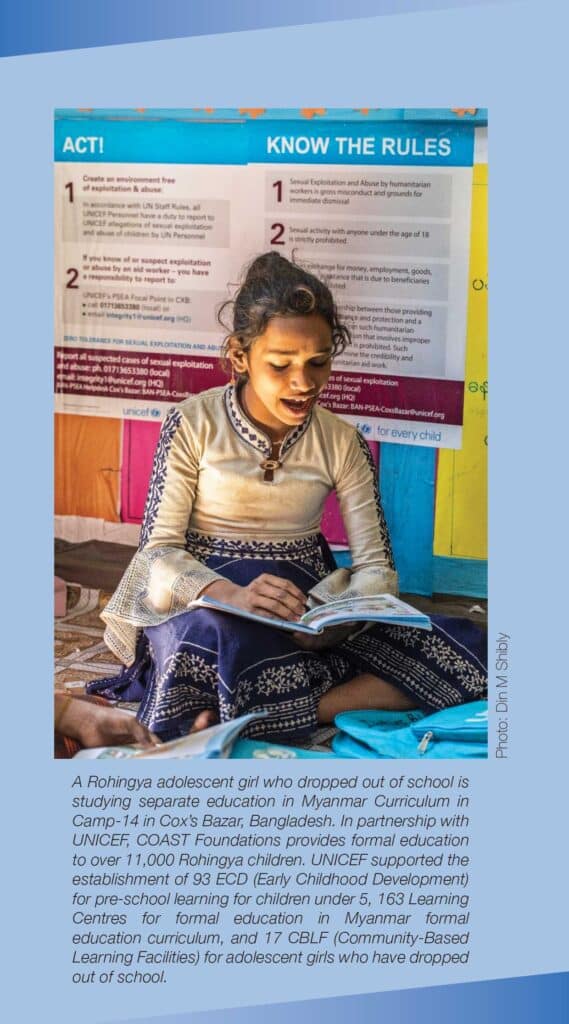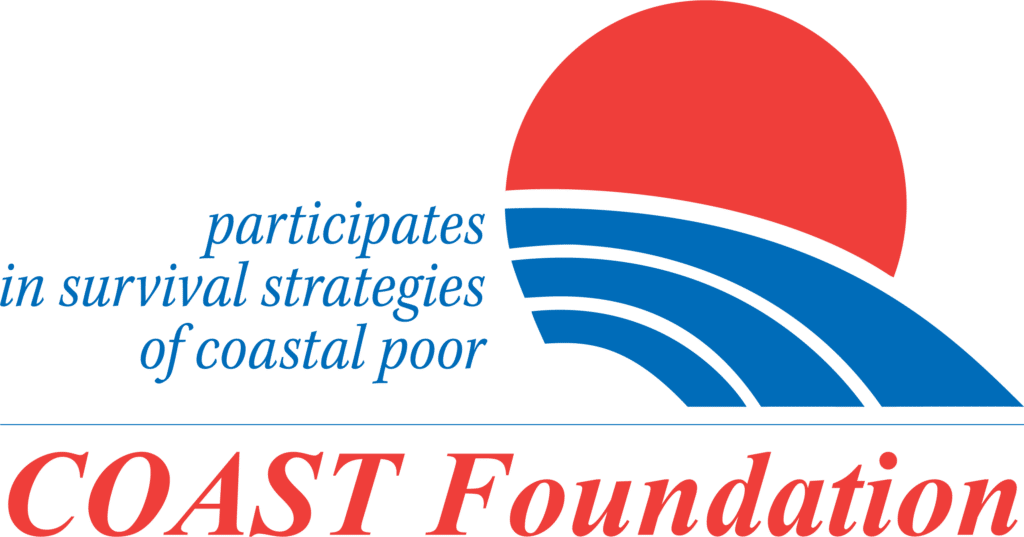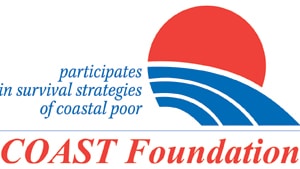Introduction
UNICEF has steadfastly supported Bangladesh (the then East Pakistan) since 1949, before the nation’s birth. Over the decades, the organization has played a crucial role in combating diseases such as tuberculosis (TB), smallpox, malaria, and cholera while bolstering water, sanitation, and hygiene (WASH) facilities and training healthcare professionals. Notably, UNICEF mounted a swift and effective response to the catastrophic cyclone that struck on November 12, 1970, saving the lives of half a million people in coastal areas. Approximately 10 million people sought refuge in India during the Bangladesh Liberation War in 1971. UNICEF collaborated with other UN agencies to support the refugees in West Bengal, including providing shelter, food, and water. Following independence, UNICEF boosted its partnership with Bangladesh, significantly contributing to the country’s recovery and development efforts, thereby aiding in the achievement of both MDG and SDG targets.
Partnership with UNICEF: Motivation Towards a Sustainable Approach
From 2011 to 2021, COAST Foundation partnered with UNICEF in Bhola, Bangladesh. The collaboration involved various interventions, including development communication, awareness campaigns, empowerment of women and adolescents, and child marriage prevention. COAST staff members received valuable training from UNICEF on different topics that enhanced the sustainability of the partnership. COAST aimed to ensure continuous awareness, education, and engagement with protection for women and adolescents in its operation areas beyond the project period. To do that, COAST launched Radio Meghna in 2015, its first community radio station (https://radiomeghna.net) in Charfession, Bhola. The second community radio station, Radio Saikat https://radiosaikat.net), was established in 2021 in Cox’s Bazar. Both stations have become the platforms for coastal communities’ voices, bringing positive changes in adolescent and women empowerment. Despite challenges, COAST successfully recruited the local girls into the radio teams, highlighting the transformative power of women-led initiatives. Notably, the stations are the only community radio stations in Bangladesh that are led entirely by adolescent girls.
Rohingya Influx in 2017
When Rohingya refugees fled the lethal violence in Myanmar, seeking shelter in Bangladesh, UNICEF and its partners swiftly initiated emergency response efforts. Their primary objective was to safeguard the rights of over 700,000 refugees, half of whom were children, and shield them from diseases, acute malnutrition, violence, abuse, and exploitation while also ensuring access to vital water, sanitation, and hygiene (WASH) facilities. Concurrently, the program introduced an Education program tailored to the Myanmar curriculum for children and adolescents residing in the camps. It marked the beginning of COAST’s second partnership with UNICEF, focusing on the Rohingya response, which continues today.
UNICEF Partnership: A multi-year Approach
Typically, partnerships commence for three months to one year, yet they often extend for several additional years. This extended timeframe allows partner NGOs to secure direct funding and enhance their capacities through various capacity-building initiatives. These include knowledge transfer, technology support, training programs, operational and policy assistance, and partnership capacity-strengthening endeavors. Not only does UNICEF’s multi-year partnership approach foster the development of partner NGOs’ emergency response capabilities, but it also contributes to their organizational sustainability and leadership.
Program Approach
UNICEF’s NGO partners find a bottom-up approach in budget preparation, program designing, implementation of joint partnership review meetings, and joint program visits (PV). A unique program approach that allows partners to be meaningfully engaged in program design and implementation. This approach upholds mutual partnership, accountability, shared responsibility, and success.
Towards a more sustainable approach
The World Humanitarian Summit in 2016 and the Grand Bargain commitments underscored the critical need to bolster support and funding for local and national responders, advocating for humanitarian action to be ‘as local as possible’ and ‘as international as necessary’. UNICEF, aligning with this agenda, has prioritized the localization approach. COAST Foundation is a partner of UNICEF, and it also holds the secretariate of the Cox’s Bazar CSO-NGO Forum-CCNF (www.cxb-cso-ngo.org), a platform comprising several local NGOs, many of which are also UNICEF partners, here providing some recommendations aimed at fostering higher-quality partnerships and response:

- Micro Assessment and Audit
UNICEF offers minimal capacity-building assistance to partner NGOs identified in the Micro Assessment and Mid-Term Audit reports. While these reports identify weaknesses, gaps, or flaws, it’s primarily the responsibility of partner NGOs to address these challenges. Addressing these challenges by UNICEF is imperative for enhancing partnership efficacy and sustainability. - Special Audit Procedures
UNICEF conducts special audits, sometimes without sharing the Terms of Reference (ToR) with partner NGOs. Additionally, adherence to timelines is inconsistent, and requests for other documents are beyond the scope of UNICEF projects, posing risks to partnership integrity. Formalizing these procedures is essential to mitigate partnership breaching risks and ensure audit processes’ efficiency. - Flexibility in 7% Capacity Strengthening Expenditure
While partner organizations currently receive funding for capacity development, there is ambiguity regarding their autonomy in utilizing these funds—for instance, whether they can invest in purchasing land or constructing offices or training centers. It should be their choice. Partner NGOs should have autonomy in spending and capacity strengthening on their own. - 7% Implementing Partner (IP) Contribution Requirement
While the current policy mandates a minimum 7% contribution from implementing partners, it’s noteworthy that International NGOs often possess funds or co-funding mechanisms to fulfill this obligation, whereas Local NGOs (LNGOs) may lack such financial resources. UNICEF should consider this discrepancy and explore measures to address this challenge. - Sustainability Planning
Upon concluding partnerships with UNICEF, it’s vital to consider how partner NGOs can achieve financial and institutional sustainability. It involves strategic planning for post-partnership sustainability. Developing partnerships with an exit strategy ensures that partner NGOs can thrive independently and sustainably beyond the duration of the collaboration. - Service Gap During Program Document Development
It often takes more than sixty days to develop Program Documents (PD) or the next program plan. This prolonged period poses challenges such as staff retention issues for partner NGOs and incurring penalties for office rent. Reducing this duration is imperative to mitigate these challenges while ensuring uninterrupted partnership continuity. - Advocacy Collaboration
While UNICEF conducts advocacy efforts with the government and other agencies, there often needs to be more engagement with its partner NGOs in these initiatives. However, partner NGOs possess invaluable local knowledge and insights on pressing issues, making them instrumental in advocating for sustainable approaches. UNICEF should prioritize involving local partner NGOs in its advocacy campaigns. - Limited Visibility of Partner NGOs
Partner NGOs play a pivotal role in achieving success, yet their visibility in UNICEF reports and external communications is often minimal or nonexistent. That only partially complies with UNICEF’s commitment to localization. Partner NGOs rightly demand equal visibility in partnerships to recognize their contributions.
Breezing the gap, not to breach the partnership: A good practice of SHOUHARDO Project
SHOUHARDO project, led by CARE Bangladesh and funded by USAID since 2004, with additional support from the Government of Bangladesh (GoB), has brought enduring change to 549,000 impoverished individuals. Partner NGOs were selected through a rigorous Due Diligence Assessment (DDA), identifying areas for capacity development to strengthen implementation capacity and ensure sustainability. The project prioritized fostering partnerships rather than blame, providing significant technical and administrative support to partner NGOs through direct nurturing and oversight functions.
SHOUHARDO offers a robust commitment to meaningful and sustainable organizational development, sharing mutual responsibility and risk for continuing the partnership. Other INGOs or intermediaries provide training, technical support, and learning-sharing opportunities. However, they often lack the same level of commitment to meaningful and sustainable organizational development. It may breach the partnership if the audits reveal faults in partner organizations during program implementation rather than focusing on capacity development and continuing partnership. Conversely, when successes occur, credit is often taken without acknowledging the vital contribution of local partners.
Download the full report PDF copy click here
COAST Foundation
Metro Melody, House, 13, Road: 2, Shyamoli, Dhaka-1212, Bangladesh.
Phone: 02- 58150082, 58152821. info@coastbe.net, www.coastbd.net




